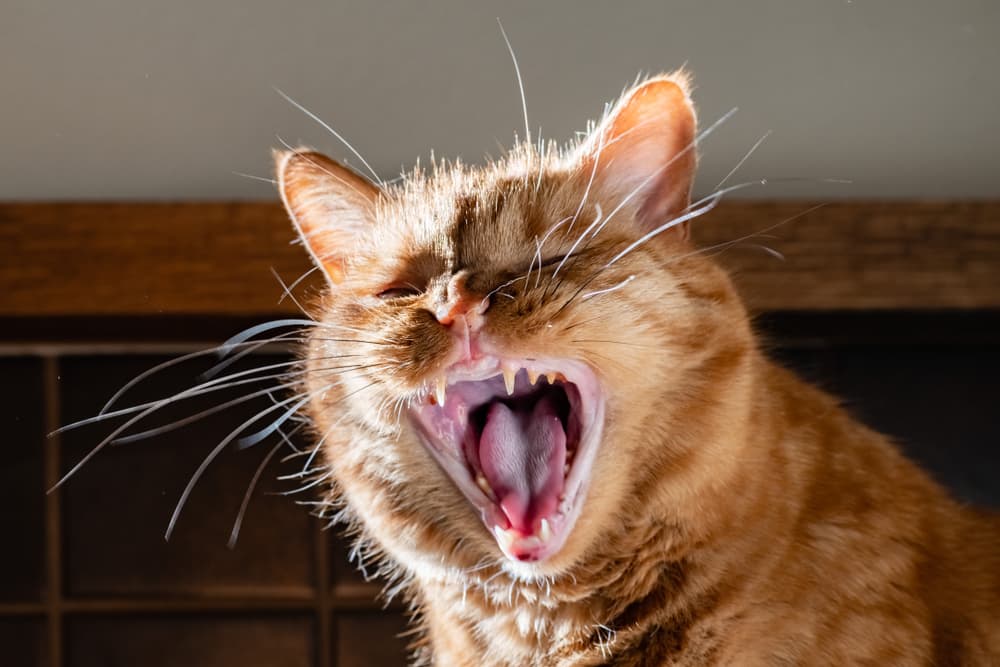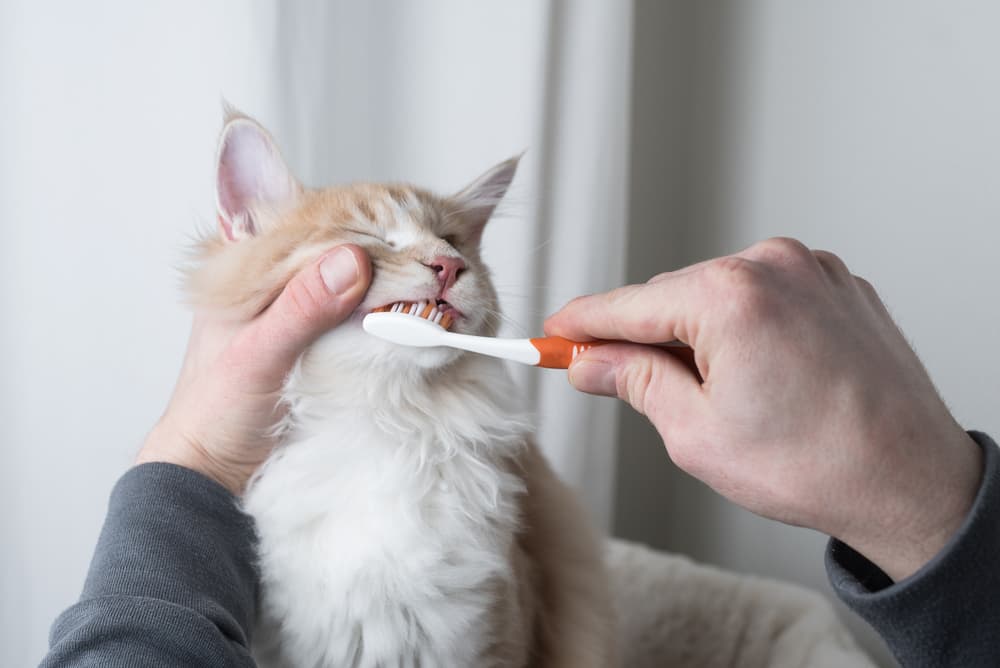Gingivitis in Cats

Overview
- Gingivitis means inflammation of the gums.
- It can range from mild to severe in adult cats.
- Bad breath, bleeding gums, and decreased appetite are common symptoms.
- Regularly brushing your cat's teeth can prevent gingivitis.
Gingivitis is a very common condition in cats, and can be found in kittens as young as five months old. It has many possible causes, but catching it early can prevent serious side effects.
If untreated, gingivitis in cats can cause pain and discomfort. By understanding gingivitis, you can work with your veterinarian to keep your cat happy and healthy.
What is Gingivitis?
Gingivitis means inflammation of the gingiva. The gingiva, commonly called the gums, refers to the pink soft tissue that is attached to the teeth in your cat’s mouth.
Gingivitis typically looks like a thin dark pink to red line along the teeth, depending on how severe it is. Occasionally, if gingivitis is severe, a cat’s gums may bleed, especially after eating or chewing on a toy.
Types of Cat Gingivitis
There are a couple types of gingivitis that cat parents should be aware of.
Juvenile hyperplastic gingivitis (or juvenile gingivitis) is when the gums are inflamed in very young cats, as young as five months old.
When adult cats have gingivitis, it can range from mild to severe. In severe cases, there may be periodontal disease occurring in the mouth. Periodontal disease, commonly called dental disease, refers to the structures holding the teeth. With feline dental disease, teeth can be weakened and break.
Gingivitis in cats can also be focal or generalized. Focal gingivitis means that the inflammation is only in one area of the mouth. With generalized gingivitis all the gums are inflamed.
What Causes Gingivitis in Cats?
Gingivitis in cats is commonly caused by bacteria. Bacteria are naturally found in a cat’s mouth, and many of the bacteria are beneficial to your cat’s health. But because cats do not brush and floss their teeth, debris—called calculus or tartar—can build on the teeth.
It is easier for the bacteria to reach into the space between the teeth and gums, causing an infection and subsequent inflammation.
Gingivitis can indicate serious underlying disease, such as periodontal disease. Since periodontal disease occurs in at least 15 percent of cats, all cats with gingivitis need veterinary evaluation. It is almost impossible to diagnose periodontal disease on visual examination when your cat is awake, so your veterinarian will likely recommend anesthesia and a dental assessment.
All cat breeds are susceptible to gingivitis. It could also be hereditary, meaning some cats are born predisposed to gingivitis.
There is no proof that cats eating dry food versus canned food have a different level of gingivitis or dental disease. Cats with poor nutrition in general may be more likely to have gingivitis.
Juvenile gingivitis does not have an exact known cause. It occurs once the baby teeth have fallen out and adult teeth erupt from the gums.
Symptoms of Feline Gingivitis

In mild forms of gingivitis, you are unlikely to notice symptoms in your cat. However, if gingivitis is more severe, your cat will experience pain in the mouth as well as other more serious periodontal disease.
A disease process that may accompany gingivitis is called stomatitis. This is a very painful condition, making it hard for cats to eat and groom their fur.
Symptoms of feline gingivitis may include:
- Halitosis, or bad breath
- Very small amount of blood on food and water bowls, or hard toys
- Decreased appetite, or becoming a picky eater
- Avoiding dry food or hard treats
- Pawing at the mouth especially after eating or chewing
- Chewing primarily on one side of the mouth
- Unkempt fur coat from a lack of grooming
Diagnosing Gingivitis in Cats
Gingivitis is diagnosed by a veterinary examination. Your veterinarian will determine the severity and location, which will affect how the condition is treated. If your cat has had gingivitis chronically since a young age, it may be diagnosed as juvenile gingivitis.
The challenging part of gingivitis is not the diagnosis, but understanding what is causing it. Your veterinarian may recommend blood testing for other conditions associated with gingivitis.
A thorough dental examination under anesthesia is the best way to search for the cause of gingivitis. If more serious periodontal disease is involved, it cannot be diagnosed or treated when your cat is awake.
X-rays and special dental equipment are required to diagnose periodontal disease.
How to Treat Gingivitis in Cats

Gingivitis can be treated. If it is mild, your veterinarian will likely recommend oral hygiene at home. The most popular option includes brushing your cat’s teeth with toothpaste formulated for cats. Ideally, this should be done daily.
There are also some prescription diets that decrease the amount of tartar on a cat’s teeth, which may prevent the gingivitis from getting worse. Sometimes your veterinarian will prescribe antibiotics to treat any bacterial infections that may be causing the gingivitis.
The best treatment is a thorough dental examination and cat teeth cleaning under anesthesia. During the cleaning, a veterinary technician will remove bacteria and debris found beneath the gums. If any periodontal disease exists, your veterinarian may recommend removal of diseased teeth.
Your veterinarian may prescribe medications that suppress the immune system in more severe cases. This is because, in some cats, the immune system attacks their teeth for an unknown reason. In suppressing the immune system, the medication stops the body from attacking the teeth and causing painful gingivitis in cats.
Homeopathy for Gingivitis in Cats
There are many holistic remedies for gingivitis that are intended to decrease inflammation in the mouth. However, these remedies will not work without also getting dental cleaning and assessment for periodontal disease. Ideally, seek a holistic veterinarian for treatment.
Examples of homeopathy for gingivitis in cats include:
- Feeding a high-quality diet
- Acupuncture
- Homeopathic veterinary prescribed formulas, which may include probiotics and various compounds (like nitric acid or Belladona)
- Commercially available homeopathic formulas, which may include vitamins, minerals (like zinc), probiotics (like Lactobacillus) and plants (like Echinacea)
- Natural enzymes that alter immune system response (like lactoferrin or coenzyme Q10)
- Chinese herbal therapies (like Yu Nu Jian or Qing Wei San)
Please speak with a veterinarian before giving your cat any supplements or herbal remedies. If given incorrectly these remedies could be harmful for your cat.
Costs to Treat Cat Gingivitis
For mild gingivitis, you may only spend $10-$20 on items needed to brush your cat’s teeth at home. In visiting your veterinarian, depending on the severity of gingivitis, you are likely to spend $100 or more for a thorough examination, blood testing, and medications.
If your cat needs a dental cleaning and assessment under anesthesia, this requires a special procedure that will likely cost $300 or more. This is highly variable depending on where you live and how severe your cat’s condition is. If your cat has periodontal disease or stomatitis as well as gingivitis, expect the price of treatment to go up.
How to Prevent Gingivitis in Cats

Although some forms of gingivitis are hereditary or associated with other diseases, keeping your cat’s mouth and teeth healthy can help prevent gingivitis.
In order to prevent gingivitis in cats, follow these tips:
- Feed your cat a high quality diet
- Brush your cat’s teeth as often as possible with toothpaste formulated for cats
- Keep your cats away from other unfamiliar cats who could expose them to viruses
- Visit your veterinarian at least once every year
Related Conditions
There are several viruses associated with gingivitis in cats. These include:
- Feline leukemia virus (FeLV)
- Feline immunodeficiency virus (FIV)
- Feline calicivirus
Knowing whether or not your cat has these viruses requires testing at a veterinary clinic.
In severe cases, gingivitis may be associated with chronic medical conditions that decrease your cat’s immune system. Specifically, cats with chronic kidney disease often have gingivitis and other periodontal disease.









